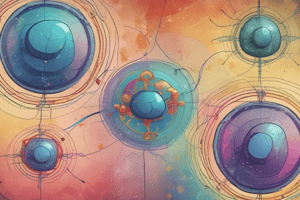Podcast
Questions and Answers
What is the primary function of mitosis in cell division?
What is the primary function of mitosis in cell division?
- Allocating cytoplasm to daughter cells
- Dividing genetic material into daughter cell nuclei (correct)
- Facilitating programmed cell death
- Increasing the cell's overall size
Which phase of the cell cycle is characterized by DNA replication?
Which phase of the cell cycle is characterized by DNA replication?
- G1 phase
- G2 phase
- S phase (correct)
- M phase
What happens to new cells after cytokinesis?
What happens to new cells after cytokinesis?
- They replicate their DNA immediately
- They inherit a full set of chromosomes and half of the cytoplasm (correct)
- They contain half the genetic material of the parent cell
- They become differentiated cells
What is the G0 phase in the cell cycle?
What is the G0 phase in the cell cycle?
What process allows for multiple rounds of DNA synthesis without cell division?
What process allows for multiple rounds of DNA synthesis without cell division?
How many chromosomes may common bean embryos have after several endoreduplication cycles?
How many chromosomes may common bean embryos have after several endoreduplication cycles?
Which of the following cell types is known to undergo successive cell cycles?
Which of the following cell types is known to undergo successive cell cycles?
What special state can initials of plant cells enter due to environmental factors?
What special state can initials of plant cells enter due to environmental factors?
What is the main function of the G1 checkpoint in the cell cycle?
What is the main function of the G1 checkpoint in the cell cycle?
Which phase of the cell cycle is characterized by DNA replication and synthesis of DNA-associated proteins?
Which phase of the cell cycle is characterized by DNA replication and synthesis of DNA-associated proteins?
What role does the spindle assembly checkpoint (SAC) play during cell division?
What role does the spindle assembly checkpoint (SAC) play during cell division?
What process occurs during the G2 phase of the cell cycle?
What process occurs during the G2 phase of the cell cycle?
Which of the following occurs during the G1 phase?
Which of the following occurs during the G1 phase?
What is formed by the merging of cytoplasmic strands during the cell cycle?
What is formed by the merging of cytoplasmic strands during the cell cycle?
Which cell cycle phase involves the checks for DNA damage before the cell enters mitosis?
Which cell cycle phase involves the checks for DNA damage before the cell enters mitosis?
What is the significance of the centrosome during the cell cycle?
What is the significance of the centrosome during the cell cycle?
Flashcards are hidden until you start studying
Study Notes
Cell Division Overview
- Cell division allows the distribution of cell contents into two daughter cells.
- In unicellular organisms, such as bacteria and protists, it leads to population growth.
- In multicellular organisms, it facilitates growth and repair of tissues.
- New cells receive an exact copy of the parent cell's genetic information.
Stages of Cell Division
- Cell division comprises two main stages: mitosis and cytokinesis.
- Mitosis distributes duplicated chromosomes to the nuclei of daughter cells.
- Cytokinesis completes the division by splitting the original cell into two new cells.
- Each daughter cell contains a full set of chromosomes and half of the parent cell's cytoplasm.
The Cell Cycle
- The cell cycle includes interphase and the mitotic phase (M phase).
- Interphase is an active stage of the cell cycle, preparing cells for division.
- Interphase is subdivided into three phases: G1, S, and G2.
- Mitosis and cytokinesis occur during the M phase.
Specialized Cell Types in Plants
- Certain one-celled organisms and specific plant/animal cell types can undergo successive cell cycles.
- Plant cells known as initials contribute to apical meristems found at root and shoot tips.
- Cells may pause their progress due to conditions like winter dormancy, entering a resting state called G0 phase.
- Differentiation and programmed cell death are alternative fates for cells.
DNA Replication and Endoreduplication
- Plant cells replicate DNA before differentiating, a process termed endoreduplication.
- Multiple rounds of endoreduplication can lead to an increased number of gene copies, enhancing gene expression.
- For instance, Arabidopsis thaliana trichomes experience four cycles, raising DNA content significantly.
Cell Cycle Checkpoints
- Two critical checkpoints manage the cell cycle, located at the end of G1 and G2 phases.
- The G1 checkpoint determines whether the cycle continues into the S phase or halts.
- The G2 checkpoint assesses DNA replication completeness and arrests progression if needed.
- The spindle assembly checkpoint (SAC) prevents anaphase from starting if chromosomes are not attached to the spindle.
Regulatory Mechanisms
- Passage through checkpoints relies on the activity of cyclin-dependent kinases.
- The cell replicates DNA, synthesizes associated proteins, and produces organelles for daughter cells.
G1, S, and G2 Phases
- G1 Phase: Intense biosynthetic activity; cells grow and prepare for division. Centrioles duplicate in cells that contain them.
- S Phase: DNA replication occurs along with synthesis of histones and other proteins.
- G2 Phase: Ensures complete chromosome replication, repairs DNA damage, and duplicates centrioles.
Nucleus and Cytoplasm Organization
- Nucleus migration begins in G1 phase, anchoring to the cell center using cytoplasmic strands from vacuoles.
- The transverse cytoplasm sheet (phragmosome), made of microtubules and actin filaments, becomes visible during cell division in large vacuoles.
Studying That Suits You
Use AI to generate personalized quizzes and flashcards to suit your learning preferences.




